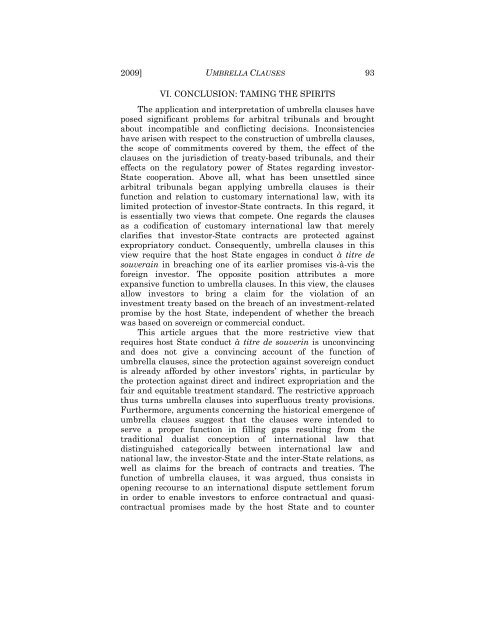Enabling Private Ordering - the University of Minnesota Law School
Enabling Private Ordering - the University of Minnesota Law School
Enabling Private Ordering - the University of Minnesota Law School
You also want an ePaper? Increase the reach of your titles
YUMPU automatically turns print PDFs into web optimized ePapers that Google loves.
2009] UMBRELLA CLAUSES 93<br />
VI. CONCLUSION: TAMING THE SPIRITS<br />
The application and interpretation <strong>of</strong> umbrella clauses have<br />
posed significant problems for arbitral tribunals and brought<br />
about incompatible and conflicting decisions. Inconsistencies<br />
have arisen with respect to <strong>the</strong> construction <strong>of</strong> umbrella clauses,<br />
<strong>the</strong> scope <strong>of</strong> commitments covered by <strong>the</strong>m, <strong>the</strong> effect <strong>of</strong> <strong>the</strong><br />
clauses on <strong>the</strong> jurisdiction <strong>of</strong> treaty-based tribunals, and <strong>the</strong>ir<br />
effects on <strong>the</strong> regulatory power <strong>of</strong> States regarding investor-<br />
State cooperation. Above all, what has been unsettled since<br />
arbitral tribunals began applying umbrella clauses is <strong>the</strong>ir<br />
function and relation to customary international law, with its<br />
limited protection <strong>of</strong> investor-State contracts. In this regard, it<br />
is essentially two views that compete. One regards <strong>the</strong> clauses<br />
as a codification <strong>of</strong> customary international law that merely<br />
clarifies that investor-State contracts are protected against<br />
expropriatory conduct. Consequently, umbrella clauses in this<br />
view require that <strong>the</strong> host State engages in conduct à titre de<br />
souverain in breaching one <strong>of</strong> its earlier promises vis-à-vis <strong>the</strong><br />
foreign investor. The opposite position attributes a more<br />
expansive function to umbrella clauses. In this view, <strong>the</strong> clauses<br />
allow investors to bring a claim for <strong>the</strong> violation <strong>of</strong> an<br />
investment treaty based on <strong>the</strong> breach <strong>of</strong> an investment-related<br />
promise by <strong>the</strong> host State, independent <strong>of</strong> whe<strong>the</strong>r <strong>the</strong> breach<br />
was based on sovereign or commercial conduct.<br />
This article argues that <strong>the</strong> more restrictive view that<br />
requires host State conduct à titre de souverin is unconvincing<br />
and does not give a convincing account <strong>of</strong> <strong>the</strong> function <strong>of</strong><br />
umbrella clauses, since <strong>the</strong> protection against sovereign conduct<br />
is already afforded by o<strong>the</strong>r investors’ rights, in particular by<br />
<strong>the</strong> protection against direct and indirect expropriation and <strong>the</strong><br />
fair and equitable treatment standard. The restrictive approach<br />
thus turns umbrella clauses into superfluous treaty provisions.<br />
Fur<strong>the</strong>rmore, arguments concerning <strong>the</strong> historical emergence <strong>of</strong><br />
umbrella clauses suggest that <strong>the</strong> clauses were intended to<br />
serve a proper function in filling gaps resulting from <strong>the</strong><br />
traditional dualist conception <strong>of</strong> international law that<br />
distinguished categorically between international law and<br />
national law, <strong>the</strong> investor-State and <strong>the</strong> inter-State relations, as<br />
well as claims for <strong>the</strong> breach <strong>of</strong> contracts and treaties. The<br />
function <strong>of</strong> umbrella clauses, it was argued, thus consists in<br />
opening recourse to an international dispute settlement forum<br />
in order to enable investors to enforce contractual and quasicontractual<br />
promises made by <strong>the</strong> host State and to counter
















